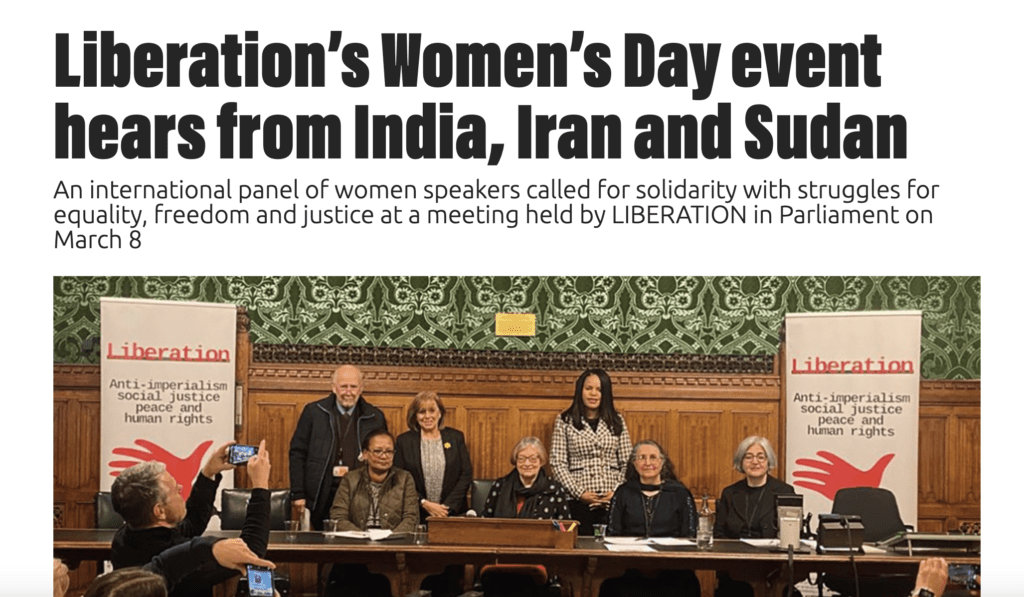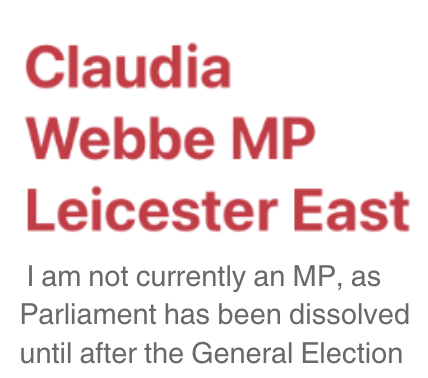
Liberation’s Women’s Day event hears from India, Iran and Sudan
An international panel of women speakers called for solidarity with struggles for equality, freedom and justice at a meeting held by LIBERATION in Parliament on March 8
CHAIRED by Baronness Christine Blower, Liberation’s International Women’s Day (IWD) rally heard from three panellists from Iran, India and Sudan, who delivered thought-provoking and moving addresses on the campaigns and struggles of women in their countries.
Azar Sepehr, representing the Democratic Organisation of Iranian Women, one of the oldest and established women’s organisations in Iran and the wider region, founded in 1943, spoke passionately about the popular unrest and street protests in Iran.
Sparked by the brutal killing of 22-year-old Mahsa Amini in the custody of the so-called “morality police,” the protests have now been running for almost six months and, as in previous mass protests against the regime, the country’s women and girls are at the very forefront, Sepehr said.
“Whether in the massive protests of 2009-10, 2017-18, 2019-20, or those of the last few months, the women have Iran have been absolutely integral — for which they have paid a very heavy price in the subsequent regime onslaughts,” stated Sepehr.
“Many women activists have been forcibly disappeared or killed — or otherwise languish in prisons across Iran.”
Sepehr described how women protesters have been singled out by regime security forces for particular violence in the crackdowns, including the “calculated firing of pellet guns at their eyes, faces and sensitive areas.”
The speaker also referred to rape and sexual violence against women detainees being a commonplace occurrence in Iran and told a stunned audience how the battered and mutilated bodies of women protesters had been recovered in the days and weeks following their disappearances.
Sepehr also talked of the ominous spectre of gas attacks against girls’ schools, with 230 schools reporting such incidents across 25 of the country’s 31 provinces.
Making an urgent call for the support and solidarity of democratic, progressive, and pro-peace forces around the world for the popular, women-led, anti-dictatorship movement inside Iran, Sepehr concluded her address with a rousing cry of the core slogan of the country’s protest movement: “Women, life, freedom!”
Joginder Bains, former general secretary of the Indian Workers Association (IWA), and a noted women’s rights and equality campaigner, told the audience that the main enemy of women is patriarchy and its associated structures — which exist universally, across borders and cannot be confined to any one country or society.
“What is Indian patriarchy? There is no such thing. There is no patriarchy that is ‘Indian’ or ‘British’ or whatever. Patriarchy is patriarchy and functions to suppress and oppress women regardless of borders or nationality.”
Bains explained to the audience how the BJP government in India likes to portray itself as the saviour of women in India with slogans like “Beti bachao, beti padhao” (Save the daughter, educate the daughter).
However, she said they reveal their true colours through attempts to reintroduce Manusmriti — a reactionary religious code containing explicitly anti-Dalit and anti-women passages.
Referring to the controversial scenes upon the release from prison in August 2022 of 11 convicts serving life sentences for committing gang rape and murdering 14 members of one family during the Gujarat riots in 2002, Bains added: “The 11 were greeted from prison like heroes — they received flower garlands, their feet were touched as a mark of respect and confectionery was distributed in their honour amid a mood of celebration.”
“The difference between the current Narendra Modi regime and those that have gone before is that this regime protects criminals. It promotes male chauvinism and violent vigilantism.
“2.6 million girl children were killed between 2015 and 2021 in India — and the government’s own figures show that in 2018, 63 million women were estimated as ‘missing’ from the population,” stated Bains in a shocking reference to the extent of female infanticide in the country.
“However, all is not doom and gloom,” said Bains, citing the major role of women in the demonstrations that followed the Nirbhaya gang-rape case in Delhi, the Shaheen Bagh sit-in and the Indian farmers’ protests, as just a few examples.
Ameena al-Rashid, a Sudanese women’s activist, saluted the courageous women of the world for their unceasing struggle, not only against patriarchy but brutal dictatorships.
Rashid described how women had formed the backbone of the revolutionary movement in Sudan in December 2018 that went on to topple the 30-year-old military-Islamist dictatorship of Omar al-Bashir.
“The Sudanese women marched in their thousands, day and night, for three long months and accounted for at least 70 per cent of those who took to the streets in Khartoum, Omdurman, al-Ubayyid, al-Fashir, and even in the country’s south.”
The speaker explained that the reason Sudanese women were so invested in the revolutionary movement owed to their experiences from the very outset of the Bashir dictatorship in 1989.
Sudanese women were soon banished by edict from the public sphere — forced to study a much narrower educational curriculum, subjected to arbitrary 7pm curfews, banned from driving and lashed in the streets if they dared to defy the authorities.
Similar to the situation in Iran, those women who continued to dissent would face abuse, rape and torture in regime prisons, or were forcibly disappeared.
Rashid described the enduring resolve of the Sudanese women to continue with the struggle following the military coup led by Abdel Fattah al-Burhan in October 2021.
“While Sudan’s modern history is characterised by long periods of dictatorship punctured by short periods of democratic rule, we very much value those short periods because they serve to demonstrate the resolve of the Sudanese people for peace, freedom and justice in the country.”
Claudia Webbe MP said how inspired she was by the three speakers and the struggles they represented and recalled the words of the renowned feminist activist Angela Davis: “I am no longer accepting the things I cannot change. I am changing the things I cannot accept.”
Webbe also quoted Azza Qasem, the Palestinian women’s activist: “The occupation has stopped us from achieving real social change by imposing restrictions on our daily lives; it locks people into thinking only of their basic needs […] There is no free society without free women.”
Webbe herself added: “That is why the struggles in Iran, Sudan and India are such important struggles and may we continue to move towards the day of liberation.”
Liberation would like to put on record its gratitude to the three guest speakers for the valuable, timely and moving insights they provided regarding the struggle of women in their respective countries, as well as to all those — including several woman MPs — who attended and contributed to making the event on a great success.
We reiterate the urgent calls made by the speakers for considered and principled international solidarity with the popular movements they each represented — as well as the many others around the world in which women have a clearly pivotal role.
Liberation recognises that it is women who are at the forefront of the struggles against imperialism and oppression, and for peace, human rights and social justice — leading by example and bearing the brunt of any setback. We are very glad to have been able to mark IWD together in this spirit.
Liberation is an internationalist human rights organisation founded in 1954 as the Movement for Colonial Freedom — Liberationorg.co.uk.
Claudia Webbe MP is the member of Parliament for Leicester East. You can follow her at www.facebook.com/claudiaforLE and twitter.com/ClaudiaWebbe


